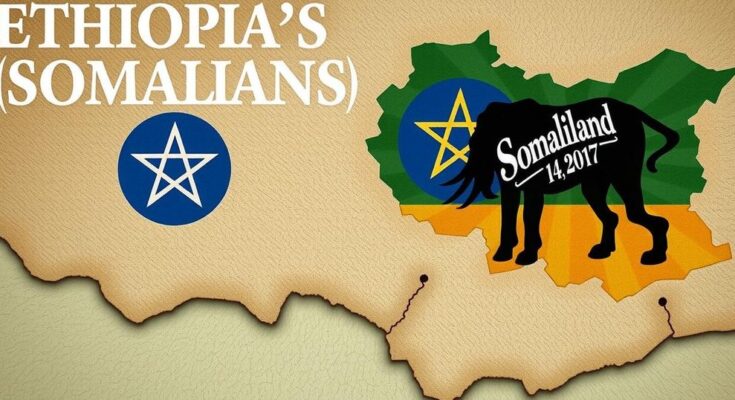Ethiopia accused Somaliland of involvement in escalating clan conflicts, particularly over grazing rights, leading to numerous casualties and heightened tensions. A recent meeting between security officials aimed to address the situation, with Ethiopia asserting evidence of Somaliland’s military involvement. The unrest may be politically motivated, linked to former Somaliland President Muse Bihi Abdi’s activities. The situation emphasizes the need for effective conflict resolution to maintain stability in the region.
Ethiopia has raised serious allegations against the Somaliland government regarding its security forces’ involvement in escalating clan conflicts within Ethiopia. During a high-level meeting in Jigjiga, security officials from both nations deliberated over the ongoing unrest. Reports from the Somali region indicate that violent clashes between two Somali clans have intensified, particularly around the Yoale kebele in the Harshin woreda, leading to several fatalities and injuries in recent weeks.
The initial disputes over grazing rights have tragically transformed into deadly confrontations, culminating in the recent slaying of the security commander for Harshin woreda, Mohamed Abdulahi Gedi, alongside injuries sustained by his deputy during mediation efforts. Following this, the conflict deteriorated further, reported to have escalated over a span of four days resulting in at least 50 civilian casualties and significant damage to local properties.
Senior officials from the Somali region have alleged the involvement of Somaliland soldiers in these clashes, asserting that these troops attacked police forces responding to the unrest. While Somaliland security authorities contend that those engaged in hostilities are not governmental forces but rather a non-governmental militia acting in defense of their clan, Ethiopian sources maintain that there is substantial evidence pointing to these fighters being part of the Somaliland military, camouflaged as civilians.
Additionally, regional officials reported that a substantial and well-armed contingent from Somaliland crossed the border in the recent conflict. A meeting was recently held in Jigjiga to discuss these tensions, featuring key officials including President Hussein Hashi of the Somali region and high-ranking military representatives from both nations. The head of the Ethiopian Federal Police emphasized the necessity for mutual resolution of clan disputes, asserting, “Demelash asserted that the Ethiopian side possesses sufficient evidence of Somaliland’s military involvement in the conflict.”
Sources suggest that the current unrest may be linked to political machinations attributed to former Somaliland President Muse Bihi Abdi, despite claims that he has severed ties with the government following his resignation earlier this month. While Somaliland’s forces remain in the affected areas, the Ethiopian National Defense Force has begun to assert control, bolstering military presence along the border. Historically, Somaliland has maintained a peaceful relationship with Ethiopia since declaring independence in 1991, previously having reached agreements concerning maritime access for Ethiopia and military cooperation, which have yet to materialize.
The clan-based conflicts in the Somali region of Ethiopia have a long-standing history, often exacerbated by territorial disputes and historical grievances. Somaliland, which has considered itself independent since 1991 despite not receiving international recognition, has maintained a generally peaceful coexistence with Ethiopia due to economic and security ties. However, recent events have threatened this stability, as tensions flare over land and resources, underlining the delicate security dynamics in the region that involve ethnic and clan affiliations.
Ethiopia’s accusations against Somaliland highlight the complexity of clan conflicts in the region, drawing attention to the intertwined nature of local and national politics. As hostilities escalate with civilian casualties mounting, the urgent need for diplomatic engagement and conflict resolution is paramount. Without proactive measures to address these issues, the potential for further violence remains, jeopardizing the peace endured by both nations for decades.
Original Source: capitalethiopia.com



